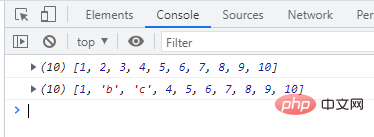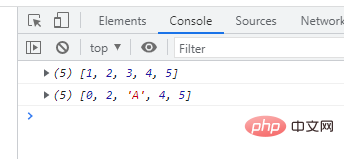How to modify the value of an array in es6
Method: 1. Use splice() to delete, add or replace elements, the syntax is "array.splice(subscript, number of elements, new value 1,..., new value X)"; 2. Re-copy the specified subscript element with the syntax "array name [subscript value] = new value;"; 3. Use replaceAll() to replace all specific elements with the syntax "str=arr.toString().replaceAll(" Search value","new value");newArr=str.split(",");".

The operating environment of this tutorial: Windows 7 system, ECMAScript version 6, Dell G3 computer.
es6 Several ways to modify array values
Method 1: Use the splice() method
Use the splice() method to delete elements, add elements or replace elements
array.splice(index,howmany,item1,.....,itemX)
| Parameters | Description |
|---|---|
| index | Required. Specifies where to add/remove elements. This parameter is the subscript of the array element to start inserting and/or deleting, and must be a number. |
| howmany | Optional. Specifies how many elements should be removed. Must be a number, but can be "0". If this parameter is not specified, all elements starting from index to the end of the original array will be deleted. |
| item1, ..., itemX | Optional. New elements to be added to the array |
Return value: an array composed of all deleted elements. If no elements are deleted, an empty array will be obtained
Example 1:
var arr = [1,2,3,4,5,6,7,8,9,10]; console.log(arr); //删除 arr.splice(1,2); console.log(arr); //打印:[1,4,5,6,7,8,9,10]

Example 2:
var arr = [1,2,3,4,5,6,7,8,9,10]; console.log(arr); //替换 arr.splice(1,2,'b','c'); console.log(arr); //打印:[1, "b", "c", 6, 7, 8, 9, 10]

Example 3:
var arr = [1,2,3,4,5,6,7,8,9,10]; console.log(arr); //添加,如果不删除元素,但是又存在第三个或者3+的参数,就会有添加的功能 arr.splice(1,0,'a','b','c'); console.log(arr); //打印:[1, "a", "b", "c", "b", "c", 6, 7, 8]

Method 2: Access the specified element through the subscript and re-copy it
Syntax for accessing the array element and re-assigning the value:
数组名[指定下标值]=新值;
The example is as follows:
var arr = [1,2,3,4,5]; //声明一个数组 console.log(arr); arr[0] = 0; //修改第一个元素,重新赋值为0 arr[2] = "A"; //修改第三个元素,重新赋值为2 console.log(arr);

Method 3: Use replaceAll() to replace all specific elements
replaceAll is Used to replace characters in a string. Of course, when we convert "array" and "string", it can also be applied to arrays. Generally used with regular expressions.
const newStr = str.replaceAll(regexp|substr, newSubstr|function)
Example:
var arr = [3, 5, "-", "9", "-"];
var newArr = [];
var str = arr.toString().replaceAll("-","新"); //数组转字符串并替换所有特定元素
console.log(str); //3,5,新,9,新
newArr = str.split(","); //字符串转数组
console.log("newArr",newArr);
//newArr (5) ["3", "5", "新", "9", "新"]javascript video tutorial, programming video 】
The above is the detailed content of How to modify the value of an array in es6. For more information, please follow other related articles on the PHP Chinese website!

Hot AI Tools

Undresser.AI Undress
AI-powered app for creating realistic nude photos

AI Clothes Remover
Online AI tool for removing clothes from photos.

Undress AI Tool
Undress images for free

Clothoff.io
AI clothes remover

AI Hentai Generator
Generate AI Hentai for free.

Hot Article

Hot Tools

Notepad++7.3.1
Easy-to-use and free code editor

SublimeText3 Chinese version
Chinese version, very easy to use

Zend Studio 13.0.1
Powerful PHP integrated development environment

Dreamweaver CS6
Visual web development tools

SublimeText3 Mac version
God-level code editing software (SublimeText3)

Hot Topics
 How to implement an online speech recognition system using WebSocket and JavaScript
Dec 17, 2023 pm 02:54 PM
How to implement an online speech recognition system using WebSocket and JavaScript
Dec 17, 2023 pm 02:54 PM
How to use WebSocket and JavaScript to implement an online speech recognition system Introduction: With the continuous development of technology, speech recognition technology has become an important part of the field of artificial intelligence. The online speech recognition system based on WebSocket and JavaScript has the characteristics of low latency, real-time and cross-platform, and has become a widely used solution. This article will introduce how to use WebSocket and JavaScript to implement an online speech recognition system.
 WebSocket and JavaScript: key technologies for implementing real-time monitoring systems
Dec 17, 2023 pm 05:30 PM
WebSocket and JavaScript: key technologies for implementing real-time monitoring systems
Dec 17, 2023 pm 05:30 PM
WebSocket and JavaScript: Key technologies for realizing real-time monitoring systems Introduction: With the rapid development of Internet technology, real-time monitoring systems have been widely used in various fields. One of the key technologies to achieve real-time monitoring is the combination of WebSocket and JavaScript. This article will introduce the application of WebSocket and JavaScript in real-time monitoring systems, give code examples, and explain their implementation principles in detail. 1. WebSocket technology
 How to implement an online reservation system using WebSocket and JavaScript
Dec 17, 2023 am 09:39 AM
How to implement an online reservation system using WebSocket and JavaScript
Dec 17, 2023 am 09:39 AM
How to use WebSocket and JavaScript to implement an online reservation system. In today's digital era, more and more businesses and services need to provide online reservation functions. It is crucial to implement an efficient and real-time online reservation system. This article will introduce how to use WebSocket and JavaScript to implement an online reservation system, and provide specific code examples. 1. What is WebSocket? WebSocket is a full-duplex method on a single TCP connection.
 How to use JavaScript and WebSocket to implement a real-time online ordering system
Dec 17, 2023 pm 12:09 PM
How to use JavaScript and WebSocket to implement a real-time online ordering system
Dec 17, 2023 pm 12:09 PM
Introduction to how to use JavaScript and WebSocket to implement a real-time online ordering system: With the popularity of the Internet and the advancement of technology, more and more restaurants have begun to provide online ordering services. In order to implement a real-time online ordering system, we can use JavaScript and WebSocket technology. WebSocket is a full-duplex communication protocol based on the TCP protocol, which can realize real-time two-way communication between the client and the server. In the real-time online ordering system, when the user selects dishes and places an order
 JavaScript and WebSocket: Building an efficient real-time weather forecasting system
Dec 17, 2023 pm 05:13 PM
JavaScript and WebSocket: Building an efficient real-time weather forecasting system
Dec 17, 2023 pm 05:13 PM
JavaScript and WebSocket: Building an efficient real-time weather forecast system Introduction: Today, the accuracy of weather forecasts is of great significance to daily life and decision-making. As technology develops, we can provide more accurate and reliable weather forecasts by obtaining weather data in real time. In this article, we will learn how to use JavaScript and WebSocket technology to build an efficient real-time weather forecast system. This article will demonstrate the implementation process through specific code examples. We
 Simple JavaScript Tutorial: How to Get HTTP Status Code
Jan 05, 2024 pm 06:08 PM
Simple JavaScript Tutorial: How to Get HTTP Status Code
Jan 05, 2024 pm 06:08 PM
JavaScript tutorial: How to get HTTP status code, specific code examples are required. Preface: In web development, data interaction with the server is often involved. When communicating with the server, we often need to obtain the returned HTTP status code to determine whether the operation is successful, and perform corresponding processing based on different status codes. This article will teach you how to use JavaScript to obtain HTTP status codes and provide some practical code examples. Using XMLHttpRequest
 How to get HTTP status code in JavaScript the easy way
Jan 05, 2024 pm 01:37 PM
How to get HTTP status code in JavaScript the easy way
Jan 05, 2024 pm 01:37 PM
Introduction to the method of obtaining HTTP status code in JavaScript: In front-end development, we often need to deal with the interaction with the back-end interface, and HTTP status code is a very important part of it. Understanding and obtaining HTTP status codes helps us better handle the data returned by the interface. This article will introduce how to use JavaScript to obtain HTTP status codes and provide specific code examples. 1. What is HTTP status code? HTTP status code means that when the browser initiates a request to the server, the service
 How to use insertBefore in javascript
Nov 24, 2023 am 11:56 AM
How to use insertBefore in javascript
Nov 24, 2023 am 11:56 AM
Usage: In JavaScript, the insertBefore() method is used to insert a new node in the DOM tree. This method requires two parameters: the new node to be inserted and the reference node (that is, the node where the new node will be inserted).







